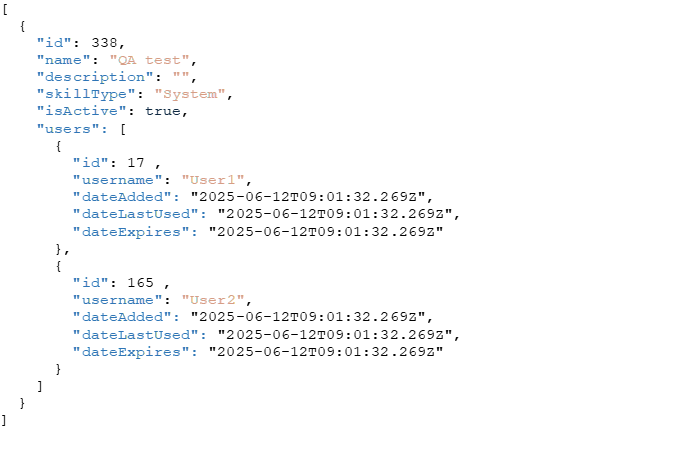Versions
Versions this documentation is relevant for:
- 8.7.0+
List
The Skill – List API call reads existing Users from Eyelit MES-M. The data can be filtered based on the parameters passed in the body of the JSON packet giving the flexibility to search for one or multiple Users.
Using the Skill – List API call has no impact on the data within the given Eyelit MES-M application, it is read-only.
Figure 1 - Logic within SKill-List API Call

Data Prerequisites
There is no data required in Eyelit MES-M to act as a pre-requisite to make the API call to list Skill, although to be able to call the Public API, a Skill must exist in the given Eyelit MES-M environment. It is, therefore, not possible to receive an empty payload in response when calling this endpoint.
Request
Table 1 shows the method and endpoint required to make the API call to list Users.
Table 1 - Outbound Message Detail for Skill - List
Method | URL Structure | Endpoint |
POST | https://[environment].mestec.net | /api/Skill/List |
The body of the payload should follow the format below:

See Table 2 for information on which fields are optional, the appropriate data types and the mappings to fields in Eyelit MES-M.
Table 2 - Parameter Information for Skill- List1
Parameter Name | Data Mapping | Data Type | Mandatory | Case Sensitive | Match Type |
ID | skill.id | NUMBER | No | N/A | Exact |
name | Skill.name | VARCHAR2(50 BYTE) | No | No | Exact |
isActive | Skill.isActive | Number | No | No | Exact |
Sample Request
See below for sample use cases with examples of the JSON payload format required.
To list Skill where the skill is equal to ‘QA test:

Response
When using the Skill – List API call, if any data has been found in Eyelit MES-M that meets the parameter values passed in the original payload, a JSON payload will be returned containing data in the following structure:

Sample Response
See below for sample use cases with examples of the JSON payload format returned.
No results were found that matched given parameters:

skill found that matched given parameters:
 Assign
Assign
The Skill – Assign API call attempts to assign a User to a skill. Figure 2 shows the logic used within the skill – Assign API call.
Figure 2 - Logic within Skill-Assign API Call

Prerequisites
When assigning a User to a Skill, both the User and Skill must exist in Eyelit MES-M.
Request
Table 3 shows the method and endpoint required to make the API call to assign a User to a Skill.
Table 3 - Outbound Message Detail for Skill– Assign
Method | URL Structure | Endpoint |
PUT | https://[environment].mestec.net | /api/Skill/Assign |
The body of the payload should follow the format displayed below:

See Table 4 for information on which fields are optional, the appropriate data types and the mappings to fields in Eyelit MES-M.
Table 4 - Parameter Information for Skill – Assign
Parameter Name | Data Mapping | Data Type | Mandatory | Case Sensitive | Match Type |
name | Skill.name | VARCHAR2(50) | Yes | No | Exact |
User |
| JSON Array |
|
|
|
id | useraccount.id | Number | No | No | Exact |
username | Useraccount.username | VARCHAR2(50) | Yes | No | Exact |
dateAdded | User_skill.dateAdded | TIMESTAMP(6) | No | N/A | N/A |
dateLastUsed | User_skill.dateLastUsed | TIMESTAMP(6) | No | N/A |
|
dateExpires | User_skill.dateExpires | TIMESTAMP(6) | No | N/A |
|
Sample Request
See below for a sample use case to assign a User to a skill. The sample provides an example of the JSON payload format required.
 Response
Response
When using the Skill – Assign API call, if the User has been successfully assigned to the Skill, a JSON payload will be returned containing data in the following structure:

Sample Response
See below for sample use cases with examples of the JSON payload format returned.

Unassign
The Skill– Unassign API call attempts to unassign a User from a Skill. Figure 3 shows the logic used within the Skill - Unassign API call.
Figure 3 - Logic within Skill-Unassign API Call

Prerequisites
When unassigning a User from a Skill, both the User and Skill must exist in Eyelit MES-M, and the given User should already be assigned to the Skill.
Request
Table 5 shows the method and endpoint required to make the API call to unassign a User from a Skill.
Table 5 - Outbound Message Detail for Skill– Unassign
Method | URL Structure | Endpoint |
PUT | https://[environment].mestec.net | /api/Skill/Unassign |
The body of the payload should follow the format displayed below:

See Table 6 for information on which fields are optional, the appropriate data types and the mappings to fields in Eyelit MES-M.
Table 6 - Parameter Information for Skill – Unassign
Parameter Name | Data Mapping | Data Type | Mandatory | Case Sensitive | Match Type |
name | Skill.name | VARCHAR2(50) | Yes | No | Exact |
User |
| JSON Array |
|
|
|
id | useraccount.id | Number | No | No | Exact |
username | Useraccount.username | VARCHAR2(50) | Yes | No | Exact |
dateAdded | User_skill.dateAdded | TIMESTAMP(6) | No | N/A | N/A |
dateLastUsed | User_skill.dateLastUsed | TIMESTAMP(6) | No | N/A |
|
dateExpires | User_skill.dateExpires | TIMESTAMP(6) | No | N/A |
|
Sample Request
See below for a sample use case to unassign a User from a Skill. The sample provides an example of the JSON payload format required.

Response
When using the Skill – Unassign API call, if the User has been successfully unassigned from the Skill, a JSON payload will be returned containing data in the following structure:

Sample Response
See below for sample use cases with examples of the JSON payload format returned.




